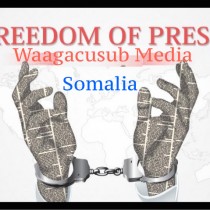
NUSOJ urges Somali Government to respect media freedom and implement UN recommendations
The report presents far-reaching narrative on attacks on freedom of expression, such as numerous arrests of journalists by the Federal Government & regional authorities, enactment of federal media law that curbs media freedom & journalists’ rights while giving the Ministry of Information more controlling powers including appointment of cherry-picked members of media council, the provisions of counter-terrorism law that threaten freedom of expression and the excessive & repeated use of the National Intelligence & Security Agency (NISA).
"The conclusions of the report should be accepted and its recommendations implemented in good faith to respect and guarantee media freedom. Specifically, the Federal Government who claims to be at the vanguard of human rights in our country should give good example to the regional administrations of Puntland, Somaliland, Jubaland and ISWA, even if they do not agree with the conclusions of this report,” said Omar Faruk Osman, NUSOJ Secretary General.
The union has long argued that the media law passed on 28 December 2015 by the Federal Parliament and ascended into law on 9 January 2016 by President Hassan Sheikh Mohamud has articles and clauses that curb media freedom, and fails to be in line with the international standards and norms of freedom of expression.
The media law outlaws 99% of current working journalists since they do not possess university degree in journalism as required by the law. The media council, envisaged in this media law, lacks independence and credible to promote highest professional standards, media accountability, mediate complaints raised by the public against the media and regulate the media.
NUSOJ protested against the composition of the media council which is dominated by government media managers and allied associates of media owners who were selected on clan-basis as presented by the Minister of Information to the Council of Ministers.
The union believes that its current composition, the media council will be a tool used to justify oppression of media outlets and journalists, and will not lend any support to free, responsible and effective media in Somalia. Shamefully the Ministry of Information tries in its response to this report to emasculate the union widely known position on the media council composition and the law.
The union had repeatedly protested and documented attacks on journalists and media outlets by the security authorities, including the judiciary harassment of media professionals who ended up to censor themselves in fear of repercussions.
"The government should go beyond current state of denial, manipulation of facts and blaming the victim journalists for causing their own victimization. Suppression and intimidation are incompatible with the fundamental right under Article 18 Provisional Constitution of Somalia and Article 19 of ICCPR on the right to receive and impart information and to freedom of expression,” declared Osman.
The report concludes: "The Government should revise and withdraw laws and practices that currently restrict and endanger the right to freedom of expression, and any measures that restrict the freedom of expression must be based on validly enacted law, subject to external and independent oversight, and be necessary and proportionate to achieving security objectives”.
Since the overall duty-bearer responsibility sits with the Federal Government, some of the important recommendations addressed to it are:
Leave a comment
| Copyright © 2009 - 2025 Sunatimes News Agency All Rights Reserved. |
| Home | About Us | Diinta | Reports | Latest News | Featured Items | Articles | Suna Radio | Suna TV | Contact Us |
 0
0 









NUSOJ urges Somali Government to respect media freedom and implement UN recommendations
The National Union of Somali Journalists (NUSOJ) today called on the Federal Government of Somalia to accept and implement without delay the conclusions and recommendations of the UN report on freedom of expression situation in Somalia.